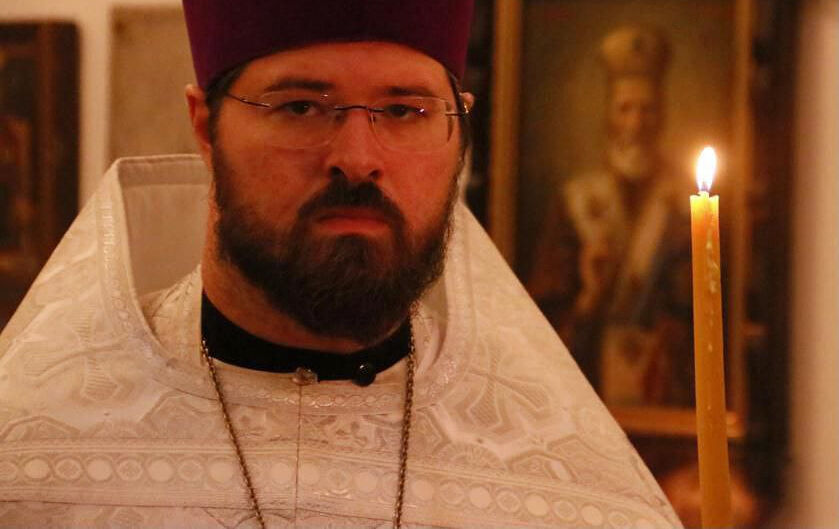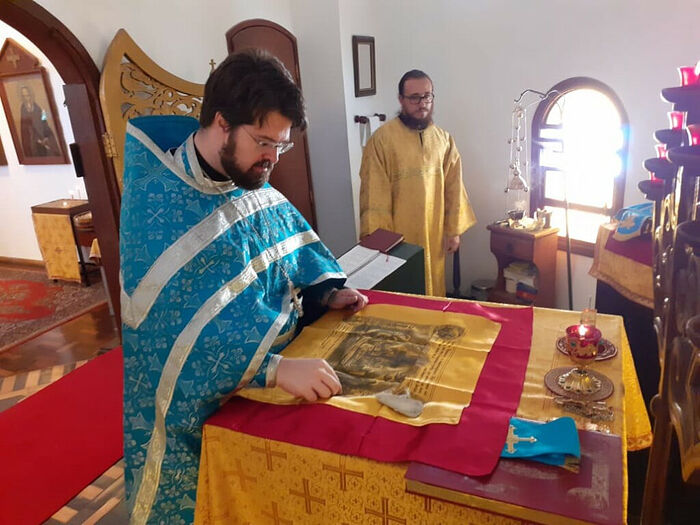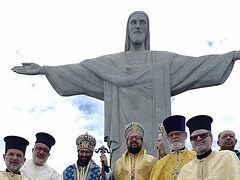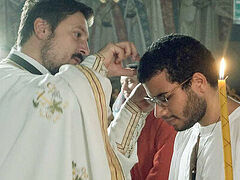Fr. Roman Kunen is the acting rector of the Church of the holy Martyr Zinaida in Rio de Janeiro of the Diocese of Argentina and South America of the Russian Orthodox Church of the Moscow Patriarchate, and also an assistant judge. He spoke with us about how tendinitis helped him convert to Orthodoxy, how Brazilians keep fasts, social networks as a means of preaching Christ and what places are worth visiting in one of the most beautiful countries in the world.
—Father Roman, how did you come to the faith? Were you born into an Orthodox family or did you convert to Orthodoxy as an adult?
—Like most Brazilians, I was baptized in the Roman Catholic Church, but I didn’t practice the faith. My parents were not religious, and I did not develop interest in the faith until I reached the age of eighteen. At that age, I began to ask the great questions of life: where did I come from? What is the purpose of life? what will happen after death?
So I started studying philosophy, which prompted me to seek God more actively. I began to attend a Catholic church, where I found something resembling an ordinary party where everyone clapped their hands while playing the guitar, and I thought it was very far from God. I also went to a Protestant church and heard an intelligent man deliver a good sermon, I heard beautiful Bach music played on the piano, but I did not feel the presence of God either.
One day on the feast of the uncovering of the relics of St. Sergius of Radonezh, my close friend, a seminarian, invited me to an Orthodox church. And when I entered the church, I had such a feeling of comfort and peace in my heart! It was the very Church I had been looking for, the Church of the Holy Fathers.
Angelic music, the fragrance of incense, the beauty of icons created an atmosphere in which I could feel the presence of God, just as the ambassadors of Prince Vladimir felt it in Constantinople.
—How did you decide to become a priest?
—I used to be a classical musician; I played the flute, rehearsed for eight hours a day, and as a result I started having problems with my tendons—tendinitis. I think it was the path God called me to walk and serve the Church, and my interest in the Church grew. I had never had any plans to become a priest. I just wanted to study our faith thoroughly and to help the Church in the way that is best for God.
I went to the Holy Trinity Monastery in Jordanville in the USA to visit my friend, a seminarian, and I was fascinated by Orthodox services, the tranquility of the monks and miracles in everyday life. I was lucky enough to meet Metropolitan Hilarion (Kapral) (eternal memory to him!), who, although he was the First Hierarch of ROCOR, showed humility and simplicity, like a true saint. In the same year, I began to study theology through correspondence at the seminary at the Holy Trinity Monastery. I got married, and four years after graduating from the seminary I was ordained by the current Metropolitan Leonid (Gorbachev) of Klin who blessed me to serve in Brazil in the Diocese of South America.
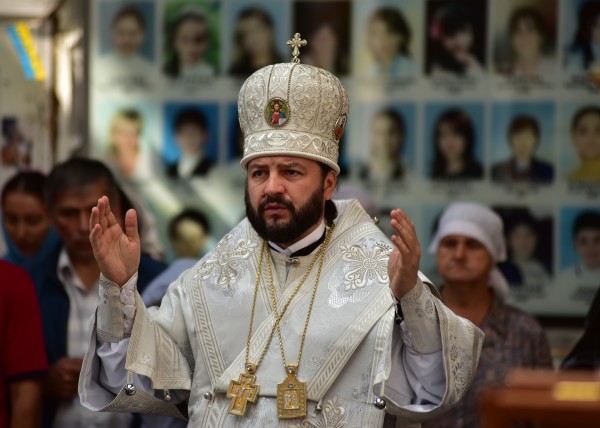 Metropolitan Leonid (Gorbachev) of Klin
Metropolitan Leonid (Gorbachev) of Klin
—Tell us about life in Brazil. Give us a more detailed picture of what the country looks like through the eyes of an Orthodox Christian.
—Brazil is one of the most beautiful countries in the world. There is a joke: In order to compensate for such natural beauty in Brazil, God placed Brazilians here. Jokes aside, Brazilians are very nice and friendly people. Our biggest problem here is violence and corruption; in many places we have rebels and drug dealers who have parallel political structures that the State cannot stop. Brazilians have always chosen the easiest paths. For example, here on Sundays people go to the beach, and then, at the end of the day, they can go to church. The idea of fasting is very difficult to understand in Brazil. On Holy Friday, Catholics in the country make some effort and eat “non-red meat”—that is, they can eat fish or chicken with cheese, and this is already an ascetic labor for Brazilians.
—When did Orthodoxy appear in Brazil?
—About 115 years ago, Syrian and Lebanese immigrants came to Sao Paulo, and Russian emigres came to southern Brazil.
—How many parishes of the Moscow Patriarchate are there in the country today? How many Orthodox are there in Brazil today and of which jurisdictions are they?
—There are seven parishes of the Moscow Patriarchate in the country: three in the south, one in the capital, Brasilia, one in Sao Paulo, one in Rio de Janeiro and one in the northeast, in Recife.
Besides these there are parishes of the Greek, Antiochian, Polish and Serbian Orthodox Churches in Brazil. The Patriarchate of Antioch is the largest in Brazil, with two bishops. There are only Brazilians in Polish churches here. In total, there are several thousand Orthodox Christians here in Brazil.
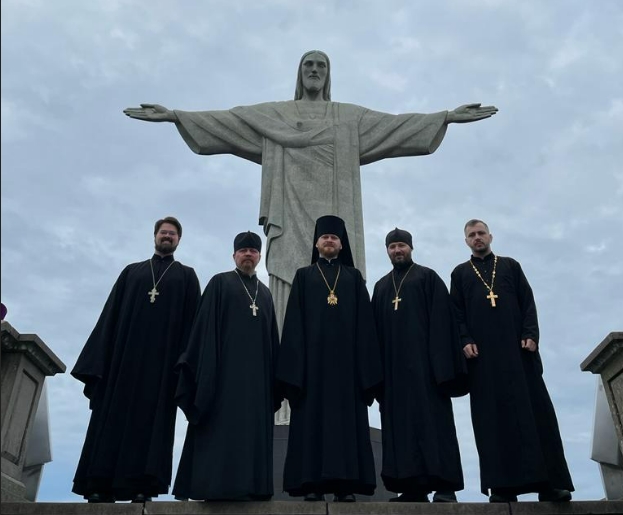 Clergy of the Metropolis after a prayer service with Bishop Leonid of Argentina and South America at the foot of the Statue of Christ the Redeemer at the top of Corcovado mountain, Rio de Janeiro
Clergy of the Metropolis after a prayer service with Bishop Leonid of Argentina and South America at the foot of the Statue of Christ the Redeemer at the top of Corcovado mountain, Rio de Janeiro
—Unfortunately, following the rapprochement between the Moscow Patriarchate and ROCOR a number of ROCOR parishes went into schism... Is it true that most of them were Brazilian? Why did it happen here? Is reconciliation possible?
—Yes, unfortunately, none of the parishes in Brazil that were in ROCOR went along with the reconciliation, including the main cathedral in Buenos Aires, in Argentina. At the time of the rapprochement, the ROCOR bishop of South America was the main opponent of the restoration of canonical communion. When this happened, the diocese’s clergy obeyed him and stayed with him. The bishop is their head to this day.
At every Liturgy we pray “for the union of all.” So we believe that the reunification may be achieved, but we must be patient and know that if it is God’s will, it will be revealed in due time.
—Now let’s move on to your parish. Tell us about the history of its foundation. How was the idea of building a church here born, and who was its initiator?
—The first Russian emigres arrived in Brazil in the 1920s and the 1930s. They were received by the Church of Antioch at the St. Nicholas Church. St. Nicholas II had donated funds to facilitate building of the church. The Russians wanted to have their own church. So they founded St. George’s Society and bought a plot on which to build a church. In 1934, Bishop Theodosy from the Russian Orthodox Church blessed the foundation stone and three years later consecrated the church. During the construction of the church, the architect’s wife died. He decided to make a generous donation and asked everyone to pray for her repose. Thus, the church was dedicated to the holy Martyr Zinaida, his wife’s patron-saint. Our church is one of very few churches in the world (if not the only one) dedicated to St. Zinaida.
—Is the community large today? What ethnic groups are represented in it?
—At the moment we have about seventy parishioners, and most of them are Brazilians. Unfortunately, many of children and grandchildren of Russian emigres did not preserve the Orthodox faith, but some Brazilians converted to it. The arrival and stay of Archpriest Vasily Gelevan [he serves in the Church of the Annunciation of the Mother of God in Sokolniki, Moscow.—Trans.] in 2007 was a turning point for the conversion of some Brazilians. He began to study Portuguese, to serve Liturgies in Portuguese and seek cooperation with other Orthodox churches in Rio de Janeiro.
 A common meal of parishioners after the Divine Liturgy. The Church of the holy Martyr Zinaida in Rio de Janeiro
A common meal of parishioners after the Divine Liturgy. The Church of the holy Martyr Zinaida in Rio de Janeiro
—Is there any pattern in the motivation of compatriot parishioners who moved to the country from Russia and other parts of the Russian-speaking world?
—Some Russian compatriots come to work at the consulate in Rio de Janeiro, others come on business, and if they like it here in Brazil, they decide to stay here forever. Recently many women have been coming to South America, mainly to Brazil, to give birth to their children here [because these countries grant citizenship at birth to foreign children.—Trans.].
—Can you give us the most striking example of a conversion of one of the locals to Orthodoxy?
—Some of our parishioners belong to the first wave of Brazilians who converted to Orthodoxy. It was a group of people who studied different traditions! Once an Orthodox priest from Portugal organized a conference. And a few months later this group went to Portugal, where they were baptized. Subsequently, they were ordained priests in Brazil—it was in 1986.
—Are there any distinctive characteristics in your parish life? What language do you worship in? Are there any peculiarities in the celebration of services? Perhaps some local traditions have developed and you observe some special feasts?
—We celebrate the Liturgy in two languages: Portuguese and Church Slavonic. We read and sing the Gospel, the Creed and “Our Father” in both languages. Our parish observes the custom of staying for a meal after the Liturgy. Everyone brings something for this occasion, and it gives everybody an opportunity to talk, discuss any issues and meet new people. Thus, the parish is like a big family for us.
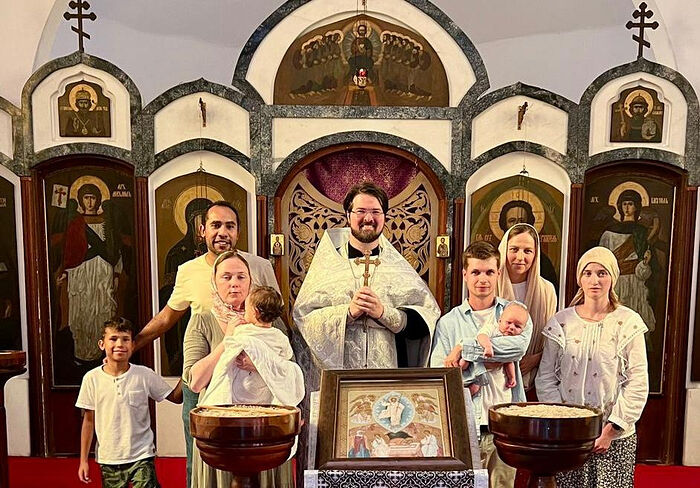 After the Sacrament of Baptism. The Church of the holy Martyr Zinaida in Rio de Janeiro
After the Sacrament of Baptism. The Church of the holy Martyr Zinaida in Rio de Janeiro
—Are your parishioners involved in the life of the community?
—In Brazil many Catholic festivals are observed, such as Easter, the feast of the patron saint of the city of Rio de Janeiro [St. Sebastian.—Trans.] on January 20, the Day of the Dead on November 2, and other holidays. Christmas is celebrated on December 25. Unfortunately, these dates do not agree with our Church calendar. Of course, our main feast is Pascha. We celebrate the feast of the Heavenly patroness of our church, Martyr Zinaida, on October 24. Our bishop, the head of the deanery and sometimes clergy from other cities and even jurisdictions usually come to honor it.
—Do you do any educational, charitable or social projects?
—We are a small parish and always try to support parish projects financially, but we are unable to implement major social initiatives. At the same time, we try to cooperate with the Antiochian Cathedral in Rio de Janeiro. They do good social work, and our parishioners donate food and clothes for homeless people as much as possible.
As for educational initiatives, we teach Church Slavonic. Our deacon, reader and members of the choir sing and serve in Church Slavonic. After the Liturgy, classes in drawing, art and literature are held at the Sunday school: we teach children and explain to them the basics of our faith.
—Tell us about the brightest events in the life of the parish over recent years.
—Last year our parish marked its eighty-fifth anniversary. Our Bishop Leonid came for the festive occasion. He served together with two other bishops from Rio de Janeiro—from the Polish and the Antiochian Churches. There were also employees of the Consulate General, guests from the Catholic Church, and Government representatives. We organized an exhibition about the history of our parish, then gave a small concert of classical music—Russian and Brazilian.
There was a very important event in 2016—the visit of His Holiness Patriarch Kirill to Brazil, including the city of Rio de Janeiro. The Primate celebrated the Liturgy on the Corcovado mountain, where the famous statue of Jesus Christ stands. After that the Patriarch visited our parish and presented us with a wonderful icon of the holy Prince Vladimir.
—Do you maintain ties with Russia at the parish level? Do you have any joint events?
—There are no joint events, but sometimes friends and clergy from Russia help us. Last year robbers broke into our church and stole some liturgical items. But believers from Moscow helped us, sending us everything we needed, including new vestments.
—Do you manage (if it’s necessary) to interact with non-Orthodox Christians and representatives of other faiths in your city?
—Yes, we maintain excellent relations with the Catholic Church. The Archbishop of Rio de Janeiro visits our parish; he also invites us to his church, and sometimes offers support.
—How are relations with the state developing? Is there any support or, to the contrary, obstacles to the community’s activities?
—Brazil is a secular state, but culturally it is a Christian country. There are many religious festivals and many tax concessions for churches.
—Do you work, and if so, why? Do you think that a priest should work?
—Yes, I work as a state employee. I’m an assistant judge. Of course, ideally, a priest should devote himself entirely to service and not have a secular job. But unfortunately, this is not the case in Brazil, where Orthodox are a tiny minority. For example, I am a married priest with three small children, and our parish is not rich and would not be able to provide for my whole family. That is why bishops in this missionary reality always apply the principle of Economy and bless the clergy to have secular jobs.
—What serious spiritual questions from the parishioners have you as a pastor encountered in your ministry? What do you consider the challenge of the time for Orthodox Christians? And specifically in Brazil?
—I believe that currently one of the main problems of humanity is depression. It paralyzes the lives of many people and even leads some to suicide. To fight depression, I try to understand Orthodox anthropology, which says that man was created as a composite of three distinct components: body, mind and spirit. And there should be a balance between these three components, so I study psychology to try and help people in all aspects. Sometimes people recover from depression by treating the body, doing exercises, changing their diets and taking the right vitamins. Sometimes a competent Christian psychologist can also help organize a patient’s life. True, sometimes depression also has spiritual roots that throw the body and the mind off balance. In this case the treatment consists of reading the Holy Scriptures and the Lives of the saints. It is a powerful medicine that motivates many people when they see that the saints went through severe trials and succeeded in overcoming them. The saints teach each one of us how to have a healthy soul and mind, since they were able to attain this balance, managed to live according to the Gospel and put into practice everything we believe in.
Organizing our lives and managing our time is one of our greatest responsibilities. No matter how busy our lives may be, we must find time for God, for the one thing needful. The frenzied pace of life in the modern world makes us forget about it. But we always have one or two minutes to pray in the morning and in the evening, and we must spend these minutes in full concentration, with all our hearts—they are vital for spiritual peace. We can listen to prayers through apps when we are on journeys. But the biggest challenge in Brazil is that there are very few cities with active Orthodox churches. Some people have to travel six hours by bus to attend an Orthodox church. Others have to go or fly by plane to another state to attend church services. Thus, going to church on Sunday becomes a real pilgrimage, which requires time management and expenses.
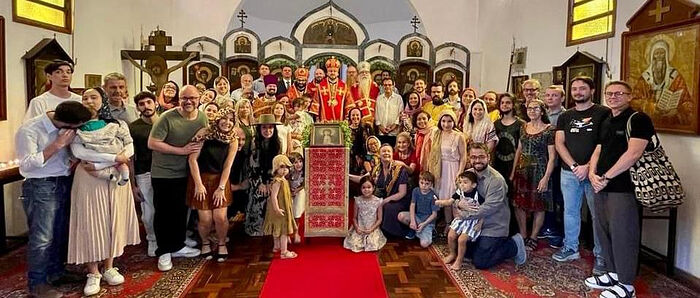 At the Divine Liturgy. The Church of the holy Martyr Zinaida in Rio de Janeiro
At the Divine Liturgy. The Church of the holy Martyr Zinaida in Rio de Janeiro
—What is the main lesson you have learned over the years of your service?
—There is no greater honor in the world than to serve the Divine Liturgy in imitation of the angels in Heaven before the throne of Christ. But there is also no greater responsibility than to be responsible for your flock. As a married priest I realized that the first and most important flock is your family, your domestic church. At the beginning of their ministry, some priests tend to devote their lives exclusively to liturgical duties and missionary work, and sometimes neglect those closest to them.
Another important lesson I have learned is that social media is an important means of spreading faith among people in Brazil. As I said, there are just a handful of Orthodox churches in Brazil, and the country is one of the largest in the world. Thus, many people do not have the opportunity to get to know the Orthodox Church and Orthodox people. To help them avoid travelling long distances, we must use technology to be able to teach, guide, comfort and help people.
—What places would you advise a pilgrim or a traveler to visit in Brazil?
—I would advise you to visit the wonderful city of Rio de Janeiro. Here we have a famous statue of Christ on the top of the mountain with open arms, greeting and blessing all guests. Brazil is a country of stunning natural beauty: we have the Amazon rainforest in the north, and the glorious Iguazu Falls in the south. In the northeast we have the most beautiful beaches in the world, especially on the island of Fernando de Noronha.
—In conclusion, I will ask our traditional question: what words from the Holy Scriptures especially inspire and support you in difficult moments of your life? Perhaps there is even a story connected with this.
—For me the most awesome fragment from the Gospel is the Twelve Gospels that describe the Passion of Christ and are read on the eve of the Holy and Great Friday: chapters 13 to 17 from the Gospel of John. It is no coincidence that he is called John the Theologian. He managed to synthesize theologically the main teachings of our Lord Jesus Christ. Here we hear the most important commandment: Love one another;as I have loved you (Jn. 13:34). We also hear: I am the way, the truth, and the life (Jn. 14:6).
The essence of the Church is in the prayer by which Christ addresses the Father so that we may all be one, like Him and the Heavenly Father. And we are consoled, knowing that after the Ascension He sent us the Spirit of Truth, our Comforter, Who will guide us to all truth.

